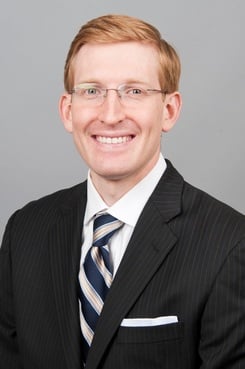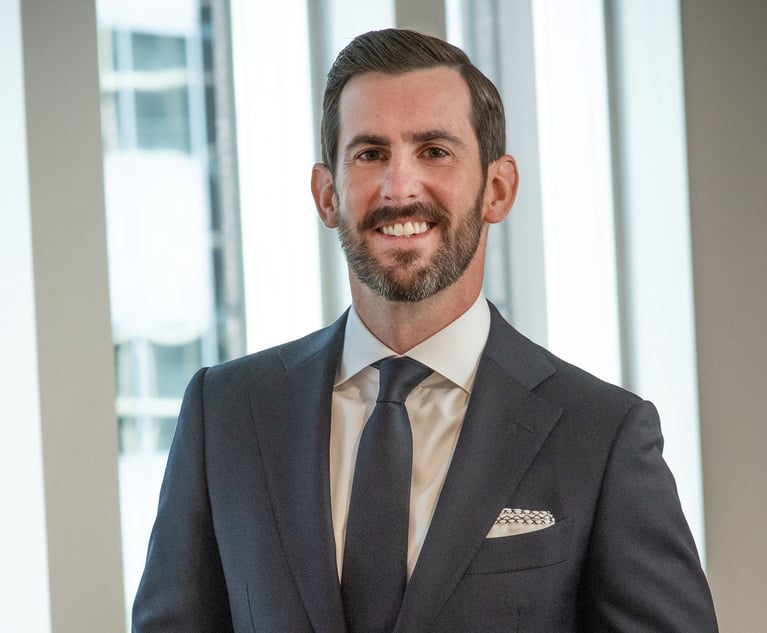'Pittsburgh History': Boring Name, Big Development for Attorney-Client Privilege
The plaintiffs propound discovery seeking your communications with the board related to the transaction. Can the company assert the attorney-client privilege against plaintiffs? Pennsylvania courts have been surprisingly quiet on this common issue until recently.
April 20, 2018 at 02:08 PM
6 minute read

You represent a privately held corporation considering a restructuring. You believe that the proposed transaction would violate the securities laws and advise the board of directors accordingly. The board, however, disregards your advice and proceeds with the transaction anyway. It violates the securities laws as you advised and several shareholders initiate derivative claims against the board on behalf of the company. The plaintiffs propound discovery seeking your communications with the board related to the transaction. Can the company assert the attorney-client privilege against plaintiffs? Pennsylvania courts have been surprisingly quiet on this common issue until recently.
A company's assertion of privilege against a derivative plaintiff creates the unusual problem of a client asserting privilege against those purporting to act on the client's behalf. Moreover, the people invoking the privilege for the corporation are generally the same people whose conduct gave rise to the derivative claim. Allowing defendants to invoke the company's privilege may deprive derivative plaintiffs of the information they need to vindicate the company's interests. A rule that allows a derivative plaintiff free access to otherwise privileged communications may impact the corporate client's willingness to seek legal advice for fear that the request or the advice could later be used against it.
Any discussion of a corporation's assertion of attorney-client privilege in the context of shareholder litigation begins with Garner v. Wolfinbarger, 430 F.2d 1093 (5th Cir. 1970). In Garner, a class of shareholders brought a derivative action on behalf of a corporation against various officers, directors and controlling persons. The plaintiffs sought communications between the corporation and its counsel relating to the conduct giving rise to the plaintiffs' claims. The corporation asserted the attorney-client privilege seeking to prevent disclosure of the communications. Both the corporation and the American Bar Association, as amicus curiae, asserted that the corporation had an absolute right to assert attorney-client privilege in such circumstances. The plaintiffs took the equally extreme position that the privilege simply does not apply in the context of derivative claims.
The U.S. Court of Appeals for the Fifth Circuit rejected both positions and adopted a “goldilocks” approach that affirmed the applicability of the attorney-client privilege for a corporation involved in litigation with its shareholders, but allowed shareholder plaintiffs to pierce the privilege for good cause: The attorney-client privilege still has viability for the corporate client. The corporation is not barred from asserting it merely because those demanding information enjoy the status of stockholders. But where the corporation is in suit against its stockholders on charges of acting inimically to stockholder interests, protection of those interests as well as those of the corporation and of the public require that the availability of the privilege be subject to the right of the stockholders to show cause why it should not be invoked in the particular instance.
The court identified a nonexclusive list of “indicia” used to evaluate whether a derivative plaintiff has good cause for piercing the attorney-client privilege: the number of shareholders and the percentage of stock they represent; the bona fides of the shareholders; the nature of the shareholders' claim and whether it is obviously colorable; the apparent necessity or desirability of the shareholders having the information and the availability of it from other sources; whether, if the shareholders' claim is of wrongful action by the corporation, it is of action criminal, or illegal but not criminal, or of doubtful legality; whether the communication related to past or to prospective actions; whether the communication is of advice concerning the litigation itself; the extent to which the communication is identified versus the extent to which the shareholders are blindly fishing; and the risk of revelation of trade secrets or other information in whose confidentiality the corporation has an interest for independent reasons. Both the Restatement (Third) of the Law Governing Lawyers and the American Law Institute's Principle of Corporate Governance: Analysis and Recommendations also adopted the substance of Garner.
There are two Pennsylvania cases addressing Garner. They reached contrary results and have not settled the law in this area. In Agster v. Barmada, 43 Pa. D. & C.4th 353, 359–60 (Com. Pl. 1999), Judge R. Stanton Wettick addressed a dispute among owners of a closely held business. A minority shareholder of a medical practice sued the majority shareholder for a variety of claims related to the majority's diversion of business away from the practice. The minority shareholder plaintiff sought communications between the majority shareholder and the corporation's counsel arguing that the attorney client-privilege does not apply to such communications. The court rejected this argument and prevented disclosure of the communication. Reasoning that the Pennsylvania Supreme Court had never recognized a conditional attorney-client privilege, the court expressly rejected Garner's “good cause” analysis as inconsistent with Pennsylvania law.
The only Pennsylvania appellate court to address the attorney-client privilege in the context of derivative litigation did so on an unusual fact pattern. In Pittsburgh History & Landmarks Foundation, 161 A.3d 394 (Pa. Commw. Ct. 2017), a group of former board members of two related nonprofit corporations asserted derivative claims against the president and current board members alleging a variety of misconduct. In response to the lawsuit, defendants formed a committee to evaluate whether the derivative action was in the best interest of the nonprofit corporations. The committee determined that the litigation was not in the best interest of the corporations and defendants filed a motion to dismiss the derivative claims on that basis. The plaintiffs sought all the information provided to the investigative committee, including communications with counsel that would otherwise be privileged. The Commonwealth Court explicitly rejected the holding in Agster and adopted Garner's “good cause” analysis. It emphasized that the possible exception to privilege only applied to communications that were “roughly contemporaneous with the events giving rise to the litigation,” presumably excluding communications that occur after a derivative plaintiff files suit.
The Pennsylvania Supreme Court granted cross-petitions for allowance of appeal from the Commonwealth Court's decision and heard oral argument on April 11. If upheld, Pittsburgh History has obvious implications for both derivative plaintiffs and corporate counsel. For the derivative plaintiff, the case provides the potential to access a variety of highly relevant communications regarding the conduct that gave rise to their claims. For corporate counsel, the case injects uncertainty as to whether the attorney-client privilege will apply to communications with a corporation in the event of shareholder litigation. Counsel should advise their client of this possibility and, in the context of a closely held company, consider whether a majority owner should obtain personal counsel in circumstances where the majority owner wants to ensure the application of the privilege.
Edward S. Robson is the managing shareholder of Robson & Robson and focuses his practice on litigation arising from commercial transactions, disputes among business owners, unfair competition and mergers and acquisitions. He has written and taught on a variety of topics affecting closely held businesses. Conctact him at 610-825-3009 or [email protected].
This content has been archived. It is available through our partners, LexisNexis® and Bloomberg Law.
To view this content, please continue to their sites.
Not a Lexis Subscriber?
Subscribe Now
Not a Bloomberg Law Subscriber?
Subscribe Now
NOT FOR REPRINT
© 2025 ALM Global, LLC, All Rights Reserved. Request academic re-use from www.copyright.com. All other uses, submit a request to [email protected]. For more information visit Asset & Logo Licensing.
You Might Like
View All
Neighboring States Have Either Passed or Proposed Climate Superfund Laws—Is Pennsylvania Next?
7 minute read
Seven Rules of the Road for Managing Referrals To/From Other Attorneys, Part 2
6 minute read
With New Civil Jury Selection Rule, Litigants Should Carefully Weigh Waiver Risks
6 minute readTrending Stories
- 1Critical Mass With Law.com’s Amanda Bronstad: LA Judge Orders Edison to Preserve Wildfire Evidence, Is Kline & Specter Fight With Thomas Bosworth Finally Over?
- 2What Businesses Need to Know About Anticipated FTC Leadership Changes
- 3Federal Court Considers Blurry Lines Between Artist's Consultant and Business Manager
- 4US Judge Cannon Blocks DOJ From Releasing Final Report in Trump Documents Probe
- 5White & Case KOs Claims Against Voltage Inc. in Solar Companies' Trade Dispute
Who Got The Work
J. Brugh Lower of Gibbons has entered an appearance for industrial equipment supplier Devco Corporation in a pending trademark infringement lawsuit. The suit, accusing the defendant of selling knock-off Graco products, was filed Dec. 18 in New Jersey District Court by Rivkin Radler on behalf of Graco Inc. and Graco Minnesota. The case, assigned to U.S. District Judge Zahid N. Quraishi, is 3:24-cv-11294, Graco Inc. et al v. Devco Corporation.
Who Got The Work
Rebecca Maller-Stein and Kent A. Yalowitz of Arnold & Porter Kaye Scholer have entered their appearances for Hanaco Venture Capital and its executives, Lior Prosor and David Frankel, in a pending securities lawsuit. The action, filed on Dec. 24 in New York Southern District Court by Zell, Aron & Co. on behalf of Goldeneye Advisors, accuses the defendants of negligently and fraudulently managing the plaintiff's $1 million investment. The case, assigned to U.S. District Judge Vernon S. Broderick, is 1:24-cv-09918, Goldeneye Advisors, LLC v. Hanaco Venture Capital, Ltd. et al.
Who Got The Work
Attorneys from A&O Shearman has stepped in as defense counsel for Toronto-Dominion Bank and other defendants in a pending securities class action. The suit, filed Dec. 11 in New York Southern District Court by Bleichmar Fonti & Auld, accuses the defendants of concealing the bank's 'pervasive' deficiencies in regards to its compliance with the Bank Secrecy Act and the quality of its anti-money laundering controls. The case, assigned to U.S. District Judge Arun Subramanian, is 1:24-cv-09445, Gonzalez v. The Toronto-Dominion Bank et al.
Who Got The Work
Crown Castle International, a Pennsylvania company providing shared communications infrastructure, has turned to Luke D. Wolf of Gordon Rees Scully Mansukhani to fend off a pending breach-of-contract lawsuit. The court action, filed Nov. 25 in Michigan Eastern District Court by Hooper Hathaway PC on behalf of The Town Residences LLC, accuses Crown Castle of failing to transfer approximately $30,000 in utility payments from T-Mobile in breach of a roof-top lease and assignment agreement. The case, assigned to U.S. District Judge Susan K. Declercq, is 2:24-cv-13131, The Town Residences LLC v. T-Mobile US, Inc. et al.
Who Got The Work
Wilfred P. Coronato and Daniel M. Schwartz of McCarter & English have stepped in as defense counsel to Electrolux Home Products Inc. in a pending product liability lawsuit. The court action, filed Nov. 26 in New York Eastern District Court by Poulos Lopiccolo PC and Nagel Rice LLP on behalf of David Stern, alleges that the defendant's refrigerators’ drawers and shelving repeatedly break and fall apart within months after purchase. The case, assigned to U.S. District Judge Joan M. Azrack, is 2:24-cv-08204, Stern v. Electrolux Home Products, Inc.
Featured Firms
Law Offices of Gary Martin Hays & Associates, P.C.
(470) 294-1674
Law Offices of Mark E. Salomone
(857) 444-6468
Smith & Hassler
(713) 739-1250






